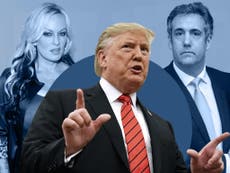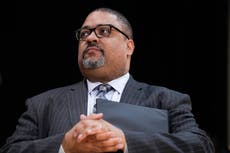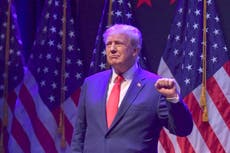Trump indictment news on hold. Why the grand jury has been delayed
There are a number of reasons why a grand jury hearing for a specific case could be delayed, canceled or rescheduled. Here’s what they do, and why interest in their daily movements is sky high
Your support helps us to tell the story
From reproductive rights to climate change to Big Tech, The Independent is on the ground when the story is developing. Whether it's investigating the financials of Elon Musk's pro-Trump PAC or producing our latest documentary, 'The A Word', which shines a light on the American women fighting for reproductive rights, we know how important it is to parse out the facts from the messaging.
At such a critical moment in US history, we need reporters on the ground. Your donation allows us to keep sending journalists to speak to both sides of the story.
The Independent is trusted by Americans across the entire political spectrum. And unlike many other quality news outlets, we choose not to lock Americans out of our reporting and analysis with paywalls. We believe quality journalism should be available to everyone, paid for by those who can afford it.
Your support makes all the difference.Donald Trump stirred a media frenzy with a false expectation of his imminent arrest and the charges against him while a grand jury in New York City continued to hear witnesses and evidence in a case involving the former president’s hush money payment to an adult film star.
The Manhattan grand jury has been meeting since January, but Mr Trump’s announcement on 18 March has put its actions under a microscope in anticipation of an indictment.
New York County District Attorney Alvin Bragg called off the grand jury on 22 March, and the jury will not hear the highly scrutinised case on 23 March, pushing any potential indictments until next week at the earliest.
There are a number of reasons why a grand jury hearing for a specific case would be delayed, canceled or rescheduled, including scheduling conflicts, illness and other court matters, as well as other cases that the grand juries are considering.
That’s not uncommon. Grand juries can typically hear multiple cases at a time. Prosecutors in New York are reviewing hundreds of cases. So the grand jury in Mr Trump’s case is likely not the only one on its agenda.
The grand jury allegedly reviewing the case involving payments to Stormy Daniels has been meeting on Mondays, Wednesdays and Thursdays. The panel is not required to meet each day, and interruptions in that three-day schedule are not unusual. Grand juries can typically meet two weeks to three months or more, according to New York state’s grand jury handbook.
They convene in secret, and prosecutors are statutorily barred from discussing their actions. It is unclear whether the panel will hear from other witnesses in the case involving Mr Trump.
Details concerning the grand jury’s actions and potential charges, which could mark the first-ever criminal indictment of a former president, are largely unknown.
Following the conclusion of witness testimony, prosecutors will explain charges and present the case to the jury for a vote. The earliest that could happen, if jurors are not considering the case on 23 March, would be the following week.
It’s important to stress that grand juries function as arms of the court, not as prosecutors or police, and they do not determine guilt or innocence, which is the role of the trial jury. Grand juries determine whether a person should be formally charged with a crime or other offence after a presentation of evidence and testimony from prosecutors.
They are composed of 23 members, at least 16 must be present to establish quorum in order to hear evidence or deliberate on charges. At least 12 grand jurors who have heard the evidence and legal instructions to vote on charges may do so.
At that point, the grand jury generally makes one of three decisions: a vote to indict, or a vote to dismiss charges, or directions to prosecutors to file with an offence less serious than a felony.
Mr Trump, on the other hand, appeared to base his prediction of his imminent arrest on media reports about law enforcement preparations in advance of a potential indictment. His team followed up to clarify that he did not receive any indications from prosecutors that he had yet been charged or would be imminently arrested.
But the former president’s comments fuelled a media firestorm and a rush of support from Republican officials and pundits who have accused the district attorney and other Democratic officials of leading a politically motivated investigation.
In a letter to a group of House Republicans who demanded Mr Bragg’s testimony to Congress, the district attorney’s office said the request marked an “unprecedented inquiry into a pending local prosecution” that would interfere with the grand jury’s proceedings in violation of the law.
“These confidentiality provisions exist to protect the interests of the various participants in the criminal process – the defendant, the witnesses, and members of the grand jury – as well as the integrity of the grand jury proceeding itself,” according to a letter from the DA’s general counsel on 23 March.




